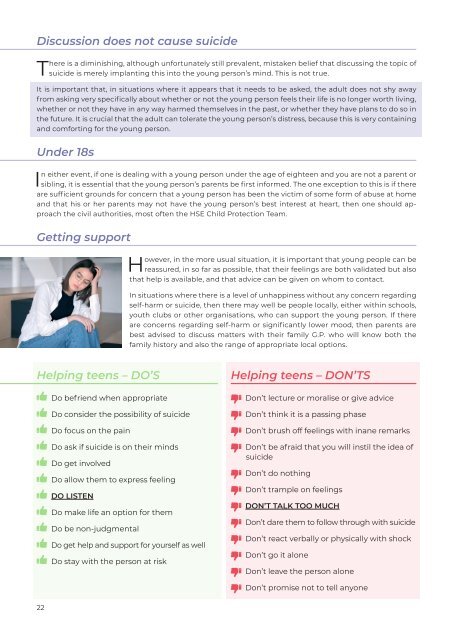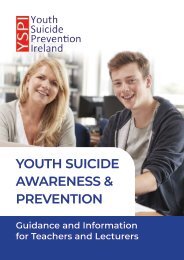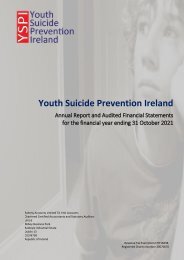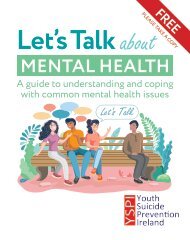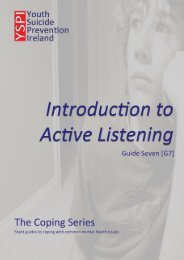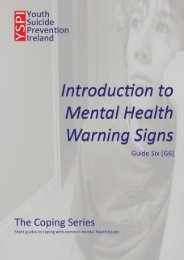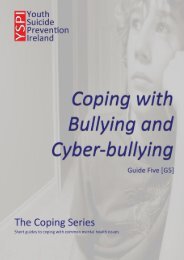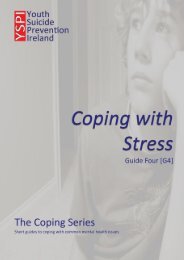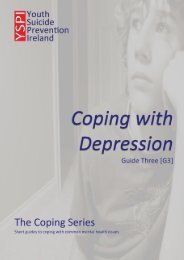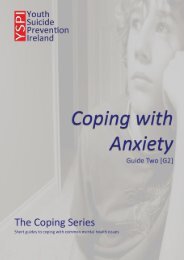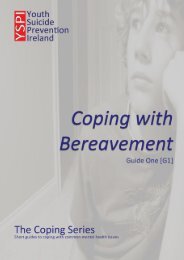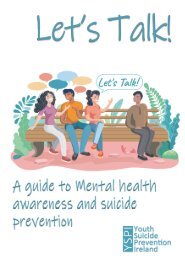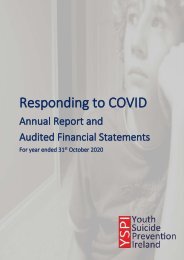What are they thinking? - YSPI Parents Handbook
A Parents Handbook to youth mental health and suicide prevention, now in it's 10th edition. Topics covered include: * Introduction to youth mental health awareness * Awareness of mental health risk factors * Recognising the symptoms of mental health issues * Helping someone with mental health issues * Understanding the dangers: Cyber-bullying Online Dangers Locked-away Syndrome * Supporting and developing coping strategies * Warnings signs of suicidal thoughts * Suicide Prevention and intervention * How to help and get help
A Parents Handbook to youth mental health and suicide prevention, now in it's 10th edition.
Topics covered include:
* Introduction to youth mental health awareness
* Awareness of mental health risk factors
* Recognising the symptoms of mental health issues
* Helping someone with mental health issues
* Understanding the dangers:
Cyber-bullying
Online Dangers
Locked-away Syndrome
* Supporting and developing coping strategies
* Warnings signs of suicidal thoughts
* Suicide Prevention and intervention
* How to help and get help
You also want an ePaper? Increase the reach of your titles
YUMPU automatically turns print PDFs into web optimized ePapers that Google loves.
Discussion does not cause suicide<br />
There is a diminishing, although unfortunately still prevalent, mistaken belief that discussing the topic of<br />
suicide is merely implanting this into the young person’s mind. This is not true.<br />
It is important that, in situations where it appears that it needs to be asked, the adult does not shy away<br />
from asking very specifically about whether or not the young person feels their life is no longer worth living,<br />
whether or not <strong>they</strong> have in any way harmed themselves in the past, or whether <strong>they</strong> have plans to do so in<br />
the future. It is crucial that the adult can tolerate the young person’s distress, because this is very containing<br />
and comforting for the young person.<br />
Under 18s<br />
In either event, if one is dealing with a young person under the age of eighteen and you <strong>are</strong> not a p<strong>are</strong>nt or<br />
sibling, it is essential that the young person’s p<strong>are</strong>nts be first informed. The one exception to this is if there<br />
<strong>are</strong> sufficient grounds for concern that a young person has been the victim of some form of abuse at home<br />
and that his or her p<strong>are</strong>nts may not have the young person’s best interest at heart, then one should approach<br />
the civil authorities, most often the HSE Child Protection Team.<br />
Getting support<br />
However, in the more usual situation, it is important that young people can be<br />
reassured, in so far as possible, that their feelings <strong>are</strong> both validated but also<br />
that help is available, and that advice can be given on whom to contact.<br />
In situations where there is a level of unhappiness without any concern regarding<br />
self-harm or suicide, then there may well be people locally, either within schools,<br />
youth clubs or other organisations, who can support the young person. If there<br />
<strong>are</strong> concerns regarding self-harm or significantly lower mood, then p<strong>are</strong>nts <strong>are</strong><br />
best advised to discuss matters with their family G.P. who will know both the<br />
family history and also the range of appropriate local options.<br />
Helping teens – DO’S<br />
Do befriend when appropriate<br />
Do consider the possibility of suicide<br />
Do focus on the pain<br />
Do ask if suicide is on their minds<br />
Do get involved<br />
Do allow them to express feeling<br />
DO LISTEN<br />
Do make life an option for them<br />
Do be non-judgmental<br />
Do get help and support for yourself as well<br />
Do stay with the person at risk<br />
Helping teens – DON’TS<br />
Don’t lecture or moralise or give advice<br />
Don’t think it is a passing phase<br />
Don’t brush off feelings with inane remarks<br />
Don’t be afraid that you will instil the idea of<br />
suicide<br />
Don’t do nothing<br />
Don’t trample on feelings<br />
DON’T TALK TOO MUCH<br />
Don’t d<strong>are</strong> them to follow through with suicide<br />
Don’t react verbally or physically with shock<br />
Don’t go it alone<br />
Don’t leave the person alone<br />
Don’t promise not to tell anyone<br />
22


